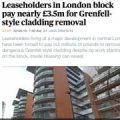 The FT today reports that government hopes that speculators in residential freeholds – especially anonymous ones hidden offshore – are unlikely to pay up to remove Grenfell cladding.
The FT today reports that government hopes that speculators in residential freeholds – especially anonymous ones hidden offshore – are unlikely to pay up to remove Grenfell cladding.
The article coincided with reports of Places for People, freeholder of Leeds Saxton, issuing a non-repayable loan to leaseholders and pursuing a claim against warranty provider NHBC. Places for People acquired the freehold in 2013, but it is unknown at this stage whether developer Urban Splash will be contributing to this cost.
 Communities Secretary at DHCLG James Brokenshire last week said local authorities would have “full backing, including financial support if necessary” to reclad private buildings, adding “They will recover the costs from building owners.”
Communities Secretary at DHCLG James Brokenshire last week said local authorities would have “full backing, including financial support if necessary” to reclad private buildings, adding “They will recover the costs from building owners.”
This means that the government still somehow believes that the freeholders should pay for cladding removal, even though in every case that has come before the property tribunal the bill has been – inevitably – dumped on the leaseholders.
Martin Boyd, trustee of LKP, said:
“The government’s approach seems fundamentally flawed in allowing the developer to absolve themselves of something which can only be the responsibility of the developer or the government.”
Of 289 private-sector buildings in England – some in the same complexes – that are more than 18 metres high and clad with the flammable material, 102 have no plans in place to replace it.
Mr Boyd said that ground rents offer a relatively small income stream and investors buy the assets for a fraction of the multi-million-pound cost of the recladding.
While Barratt and Taylor Wimpey have paid to reclad buildings they constructed, even where they no longer own the freehold, and Taylor Wimpey has set aside £30m this year for that purpose, others such as Lendlease, Berkeley Homes and Ballymore, have so far refused to pay.
The FT article also quotes Susan Bright, professor of land law at Oxford University – who has spoken at several LKP meetings – saying in a blog post: “It is not clear why all freeholders, particularly if not the developer or original owner, should have to pay . . . We are talking about a problem caused by a systemic failure in fire safety regulation and construction methods and standards.”





 Slough Council v Benji the Binman over Grenfell cladding costs at Nova House
Slough Council v Benji the Binman over Grenfell cladding costs at Nova House






















……………..responsibility of the developer or the government.”
For government, replace with the words “Tax Payers” (No government has any money – it is all tax payers money.)
Why should a tax payer, who has had nothing to do with these buildings pay for any cladding replacement
Government bears some responsibility because of flawed building regulations. Developer and their insurers have main responsibility as well, but there will be the usual buck passing.
What about he manufacturers of the cladding why are they not being sued so they in turn , turn to their product liability insurers . The cladding is clearly not fit for purposes
My Michael Caine moment.”Not a lot of people know this?”
Places for People have not paid to have the cladding removed and then charged leaseholders. Nor have they raised money from residents before carrying out the work.
What they have done instead is to give a loan to leaseholders in order to fund the project
How many leaseholders are aware that if a loan is granted, the borrowers lose their right to challenge?
So the leaseholder by accepting the loan has accepted the position of the freeholder and thereby the leaseholder has forgone their right to challenge the freeholder. .
Rather than use tax payers money the government should lend the freeholders the money with interest on the strict understanding that the costs of the works is not passed through the service charges just the interest lon the loan. The loan to be secured against the freehold
The interest rate to be the sort of interest he government would expect if issuing Gilts ie around 2-3%
Therefore rather than a lessee having to find £20k they may have to find £30 per month – not ideal but does move he problem on. Otherwise years of legal wrangling with the flats being unsaleable throughout the period and the stress of it all impinging on other facets of life
The government get an ok rate of return on its funds – no cost to he tax payer and gets a problem off its plate
A developer who uses materials signed off by building control should expect either the manufacturer to take ownership of the problem or the government for approving a material without proper testing.
Stephen you say rather than use tax payers money the government should lend the Freeholders the money with interest, and the strict understanding you mention is also ok.
But to say that the Leaseholders should pay the interest @ 2-3 % – £30 a month is saying the Leaseholder is responsible for the defective work. As Senior Improvement Officer in the 1980s and Building Control Officer in 2000 (now retired) what part of any contract allows for anyone not directly involved in a contract can be held responsible.
To say otherwise years of legal wrangling with the flats being unsaleable throughout the period and the stress of it all impinging on other facets of life, this wouldn’t happen if the Freeholder/Landlord coughed up then sued those who are linked to design and fix along with the Architect and Building Control as necessary.
To glibly pass on the costs to Leaseholders is seen as the best way forward only by those who refuse to accept responsibility, Freeholder/Landlord. A developer who uses materials signed off by Building Control, can qualify the material used if it passes Part B. If material and design doesn’t comply then what part did the Leaseholder play in either choosing the design and materials, or in the fixing?
The passing of materials as fixed and the correct material used is down to the Construction Team who should take ownership of the problem as they will have been Insured against this and paid an Indemnifying Insurance for just this purpose.
Totally agree with your comments here. I have raised the issue of liability including insurance however these appear to be moot/mute points. People appear to lack the understanding of being able to either following the money or where ground zero lies.
I find it extremely irritating that this government department now calls itself a “Ministry” but at least get it right and don’t call it “DHCLG” in your heading!
Maybe it is an attempt to remind people that McMillan’s government built large numbers of houses and that this government’s “Ministry” aims to emulate that goal.
Thanks. Changed.